Transcription
THE ONGOING SAGA OF THE "SEX FOR INFORMATION RING"
*******
As reported on this blog, as well as on solitarywatch.com, the story of the "Sex For Information Ring", which was operated by sadistic guards at MCI Norfolk, is far from over.
After the Norfolk prison officials falsely charged me with "organizing a group demonstration", sending me to solitary confinement for over three (3) months, in retaliation for exposing the "sex" ring, I filed a civil suit in the Suffolk Superior Court. See Timothy Muise vs. Gary Roden and Rebecca Donahue, No. 2011-0869-G. On May 11, 2012, a hearing was held in the Suffolk Superior Court where the disciplinary report was VACATED (fully vindicating me) and the issues of "retaliation" and "Civil Rights Violations" were ordered to go to TRIAL! Believe me this was NOT what the DOC had envisioned. As such they immediately filed a "Motion for Relief From Judgement", which I zealously opposed. On August 24, 2012, the court DENIED that motion and ruled that the DOC had caused me REAL AND SUBSTANTIAL harm in the "chilling" OF my free expression. Please see the following ruling of the Court in its entirety. This is TWICE, in this case, that the Court has told the DOC that they were wrong! It is also a harbinger of things to come at trial. In the not too distant future the DOC will be held accountable for their abuse.
The spirit of the fight is alive and well. For all the men who were subjected to the sexual abuse and cruel and unusual punishment at MCI Norfolk I am STILL fighting for you! They are STILL retaliating against me here at MCI Shirley. They won't let me work or earn any sentence deductions. The superintendent will not credit me for my seniority date toward a single cell. The DOC is failing to comply with the ORDER of the Court to reclassify me back to MCI Norfolk. I will be filing a motion to hold them in contempt of Court very soon. As I stated afore: The spirit of the fight is alive and well!
The employees of the DOC hide beyond walls and razor wire while perpetrating a public safety nightmare upon the unsuspecting citizens of the state. I can only explain by stating it is like they poke wild animals with sticks while they are locked in their cages. They then open those cages directly on to the streets of your city or town. Is this what you want from your prison system????
Please read the following Court ruling and let me know what you think?
"Who shall stand guard to the guards themselves?"
Chazal
NOTIFY
SUFFOLK SUPERIOR COURT
TIMOTHY J. MUISE,
plaintiff,
v.
GARY RODEN, et al,
defendants.
RULING OF THE COURT
Case: SUCV 2011-0869 Pleading: Plaintiff's Motion For Relief from Judgment
Date: August 24, 2012
Petitioner was subjected to prison discipline because of his outgoing correspondence. Muise is an inmate lawfully in the custody of the DOC. At all times relevant to this action, Muise was incarcerated at MCI-Norfolk. Roden is the Superintendent of MCI-Norfolk and Donahue was the disciplinary hearing officer for the hearing that was held in relation to Disciplinary Report #213260. On November 10, 2010, while reviewing Muise's outgoing mail, the correspondence at issue in this case was intercepted. The correspondence was a letter written by Muise to an outside civilian party, in which he wrote "[s]ome of the REAL hard chargers in here are going to try to organize a 'day of protest'. I will keep you posted. We NEED your help." (Emphasis in original.)
A regulation, 103 Code Mass. Regs. 481.14(2), authorizes the DOC to censor outgoing prisoner mail that contains "plans for... any activity which violates any departmental... regulation...". Donahue found, on the evidence of Muise's letter, that he had violated 103 Code Mass. Regs. 430.24(2-10) and (2-29). Section 2-10 states that "[e]ngaging in or inciting a group demonstration or hunger strike" is a category two offense.
Concluding that these regulations permitted the DOC to discipline a prisoner for attempting to incite a protest outside the perimeter, this court held that Section 2-10 was an invalid restriction on First Amendment rights held by the prisoner under Procunier v. Martinez, 416 Mass. 396 (1974). The DOC brings a motion for Relief from Judgment seeking reconsideration of this decision, and rearguing other issues raised and not found persuasive in the original motion for Summary Judgment.
For the following reasons, the defendant's Motion for Relief from Judgment is DENIED.
DISCUSSION
This court reached the conclusion that Section 2-10 was overbroad ("section 2-10's sweep of prohibited conduct includes both protected and unprotected activities") and vague (The court recognizes Muise was disciplined for conduct in violation of Section 2-29, that is he was found guilty of attempting to commit, making plans to commit, or aiding another person to commit the offense of engaging in or inciting a group demonstration or hunger strike, further diffusing the protected conduct which might come within the sweep of Section 2-10.) ("the lack of specificity in section 2-10 affords prison officials wide discretion in determining whether a correspondence constitutes inciting or engaging a group demonstration"). But the overriding constitutional concern here is the regulation's overbreadth. (In its brief, the department has focused on vagueness.)
The distinction is set forth at Commonwealth v. Abramms, 66 Mass.App.Ct. 576, 579-580 (2006). A regulation is said to be overbroad if it sweeps unnecessarily broadly and thus "invades the area of protected freedoms". Smith, Criminal Practice & Procedure 6, at 10 (2d ed. 1983). A court will consider the facial validity of a regulation notwithstanding that the conduct at issue might properly be the subject of State regulation. "It matters not that the [form of expression] used [by the petitioner] might have been constitutionally prohibited under a narrowly and precisely drawn statute.'" Commonwealth v. A Juvenile, 368 Mass. 580, 584-585, 334 N.E.2d 617 (1975), quoting from Gooding v. Wilson, 405 U.S. 518, 520, 92 S.Ct. 1103, 31 L.Ed.2d 408 (1972). "This exception [to the traditional rule of standing] is based on an overriding interest in preventing any 'chill' on the exercise of First Amendment rights." Commonwealth v. Bohmer, 374 Mass. 368, 373 (1978).
Therefore, because facial challenges increase the number of persons with standing to bring a claim, the United States Supreme Court has admonished that the overbreadth doctrine must be employed sparingly. Broadrick v. Oklahoma, 413 U.S. at 610, 93 S.Ct. 2908. If a statute's deterrent effect on protected expression is not "both real and substantial" and if the statute is "readily subject to a narrowing construction", the doctrine of overbreadth may not be employed. Young v. American Mini Theatres, Inc., 427 U.S. 50, 60 (1976). Below, the court concludes that such a test is met in this case.
I. Whether the regulation's deterrent effect on protected expression is not "both real and substantial". Id.
This court is persuaded that the likelihood the deterrent effect of the regulation will chill protected expression is both real and substantial. The record in the case proves it, because those charged with enforcing the regulation were not clear as to whether it applied only within the walls. The record suggests that DOC personnel were not mindful of a distinction between internal and external protests when they undertook to intercept Muise's letter and used it as evidence against him.
First, the disciplinary report described the offense as an "attempt to organize a group demonstration AT M.C.I. Norfolk." (Administrative Record Page 1 - "A.R.1"). (Italics supplied.) It does not specify WITHIN M.C.I. Norfolk.
Second, the record of the hearing leads to the conclusion that Donahue (and other officers) failed to appreciate a distinction between inside and outside protests before the court entered its decision. One affiant described being questioned twice about protests both inside and outside prison walls, which the affiant denied knowledge of any protest plans by Muise. (A.R. 37). Another affidavit is similar with regard to questioning within and without Norfolk, and averring that Muise was not known to speak about protests. (A.R. 38). A third affidavit described being questioned about petitioner's activities "at Norfolk"; the affiant opined that Muise was not a protester. (A.R. 39). A letter was included that explained that the "day of protest" was to be an "external, lawful demonstration of non-incarcerated people carrying signs." (A.R. 40). There was a second letter expressing the same sentiments as that referenced in the preceding sentence; this writer was the intended recipient. (A.R. 41).
Muise testified and denied planning a day of protest within the walls of Norfolk. The record shows that Muise stated that he was referring to an outside event, involving various people, at the state house. "A peaceful day of protest, lawful, outside of prison." (A.R. 43).
Donahue's conclusion was based on the officer's written report (which simply reports the content of the letter), the letter itself, and the testimony of the officer's interview of Muise (presumably where Muise refused to speak). That evidence, Donahue concluded, "cleary (sic) establishes that inmate Muise attempted to send an outgoing correspondence to an outside party that made reference to organizing a 'day of protest'."
She observed that the inmate's testimony, arguments in his behalf, and the affidavits and letters referenced above "failed to outweigh the evidence presented." It appears to this court that, in her findings, Donahue discounted the evidence about the peacefulness of Muise, thereby concluding that he was attempting to engage in a disruptive group demonstration.
Donahue went on to adjudge him guilty of attempting to commit, making plans to commit, or aiding another person to commit the offense of engaging in or inciting a group demonstration or hunger strike, reading section 2-10 and section 2-29 (on attempts) together. No distinction whatsoever was made by Donahue recognizing whether constituents of such a demonstration would be prisoners or others, and whether it was intended for INSIDE or OUTSIDE the walls.
It is important to note that there was evidence presented as to Muise's external orientation for any protest activity. Donahue's failure to make an express finding on this point satisfies this court that Donahue did not appreciate the distinction. She simply concluded that Muise intended a disruptive group demonstration without regard for its location. (The DOC has (without leave) attempted to expand the administrative record by a late-filed affidavit of Donahue. "The function of certiorari review is to correct errors of law not otherwise subject to review, where such errors are apparent ON THE RECORD and adversely affect material rights." Carney v. City of Springfield, 403 Mass. 604, 605 (1995). (Italics supplied.) The Donahue affidavit was signed well after this court ruled the regulation was overbroad. The affidavit sets forth Donahue's state of mind when she decided Muise's case; she says she believed the protest was to be internal. The court rejects this affidavit. The balance of power favors the DOC in litigation against a pro se prisoner; it would be unfair to permit the DOC to so expand the record.)
The superintendent summarily denied the appeal.
The subsequent classification report is part of the summary judgment record submitted by defendants. At Exhibit B-2 (p. 12 of 13), his prior incarceration is summarized. Therein it is stated that he received the instant disciplinary report for organizing a group demonstration in the MCI Norfolk parking lot. Without more, it states that the "picket line demonstration outside the facility was disruptive to the orderly running of the institution." This court is thus persuaded that DOC officials were understandably confused by this overbroad regulation as to the limits of their authority to sanction demonstrations outside the perimeter.
Muise is apparently an advocate in frequent written contact with outside agencies. (A.R. 34, 35) He sees himself with an "extremely large leadership role." (A.R. 43) He frequently exercises his right to free expression on behalf of the plight of prisoners. His loss of rights, should he be penalized for mail regarding outside advocacy, is far from incidental. See Commonwealth v. Provost, 418 Mass. 416, 422-423 (1994). The same would be applicable to any prisoner.
Therefore, this court is satisfied that the overbreadth in this regulation chills the exercise of First Amendment rights that is both real and substantial.
II. Whether the regulation is "readily subject to a narrowing construction." Young v. American Mini Theatres, Inc., 427 U.S. 50, 60 (1976).
The DOC's arguments do not satisfy the court in this regard. The department argues that the disciplinary process is "meant to serve as a method of maintaining order IN THE INSTITUTIONS while encouraging positive inmate behavior change." 103 CMR 430.01. Therefore, the department says, the disciplinary code relates only to behavior within the institution. As astutely noted by the prisoner, some conduct directed externally is clearly implicated by prison discipline, such as internal activity which violates an outside restraining order, or intimidates an outside [some text missing]
Group demonstrations which are exterior to an institution are communicative expression. Generally speaking, meetings for peaceable political action cannot be proscribed. De Jonge v. State of Oregon 299 U.S. 353, 365 (1937). The drafter of the regulations permitting censoring of mail might have anticipated the one regulation in the disciplinary code that is directed to expression. In this court's view, Section 2-10 should have been drafted more narrowly. As it stands, it is overbroad, and thus invalid.
III. Remaining issues
The court is entirely unpersuaded by the regulatory schemes of other states, and draws no presumption from them.
The defendants are not entitled to have the issue of qualified immunity decided at summary judgment for the reasons stated in the Memorandum of Decision.
CONCLUSION
For the foregoing reasons, the defendants' Motion for Relief from Judgment is DENIED.
So ordered:
Frances A. McIntyre
Justice, Superior Court
August 24, 2012
Other posts by this author
|
2017 jun 24

|
2017 jun 24
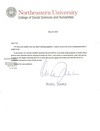
|
2017 jun 24
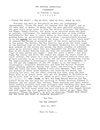
|
2017 jun 24
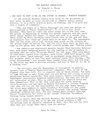
|
2017 jun 18
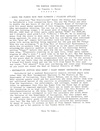
|
2017 jun 15
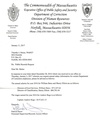
|
More... |

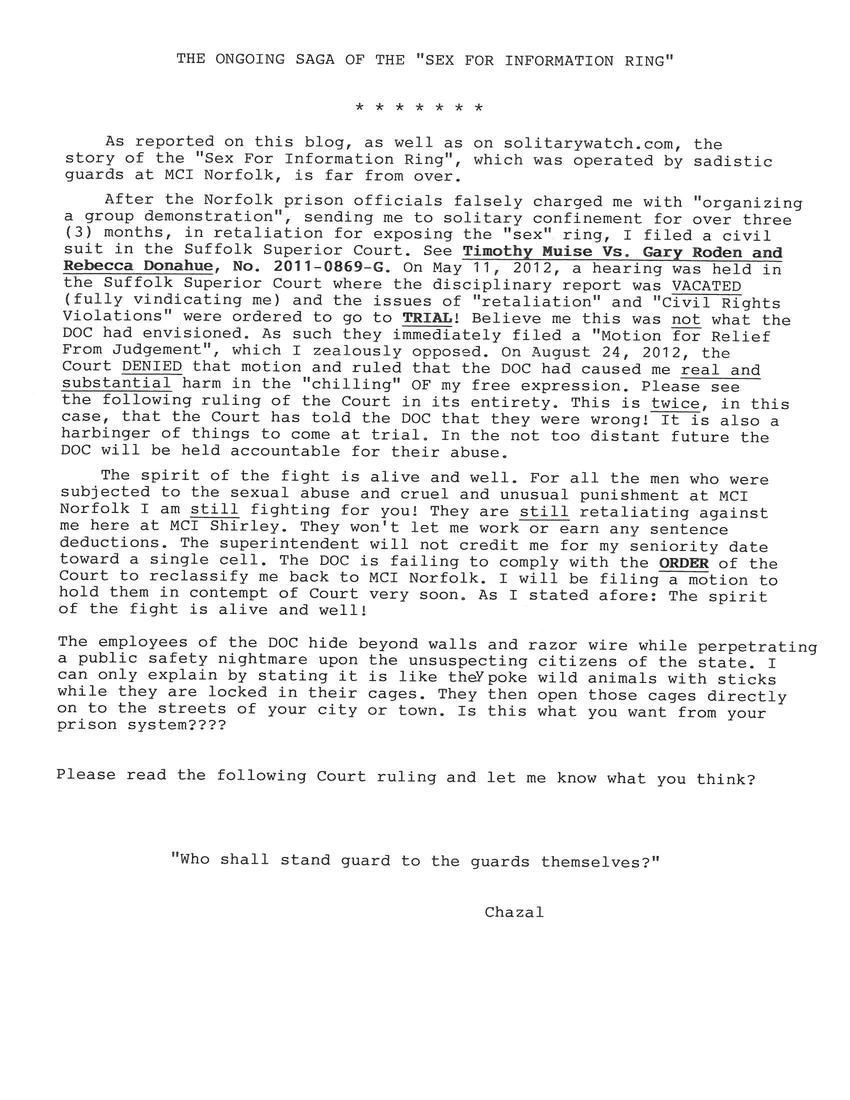
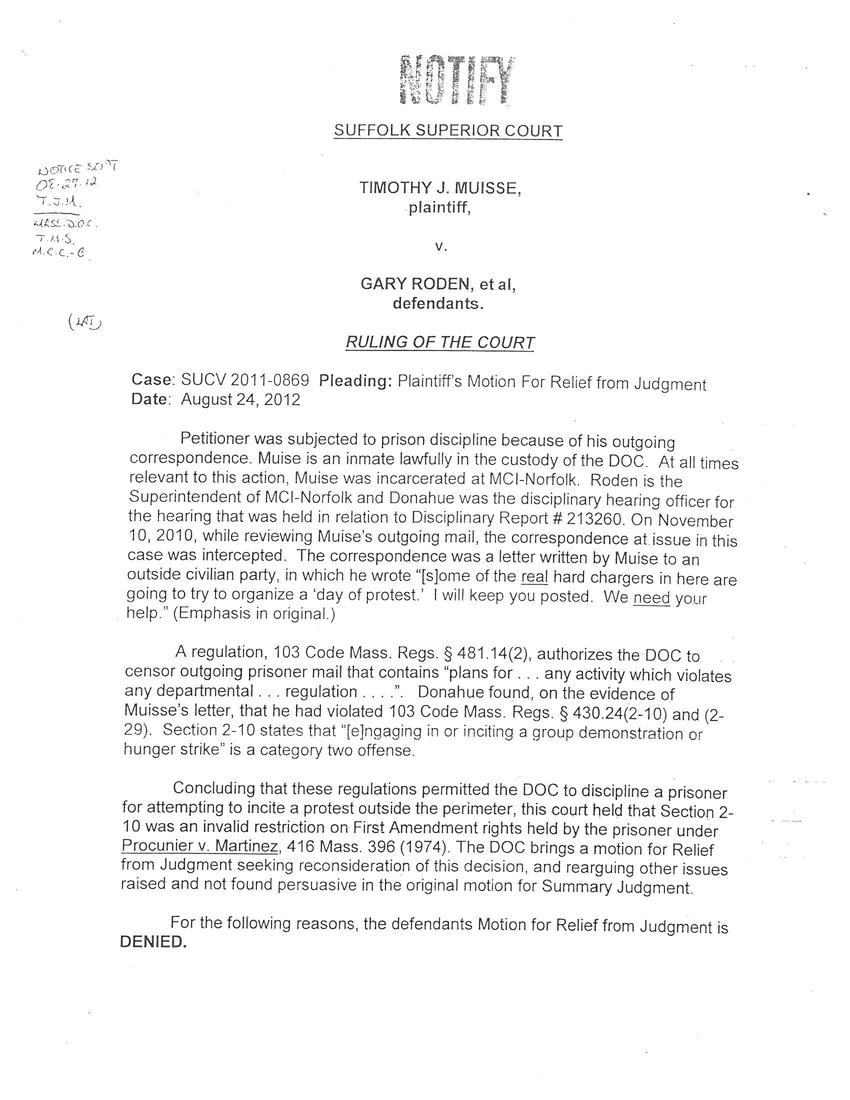
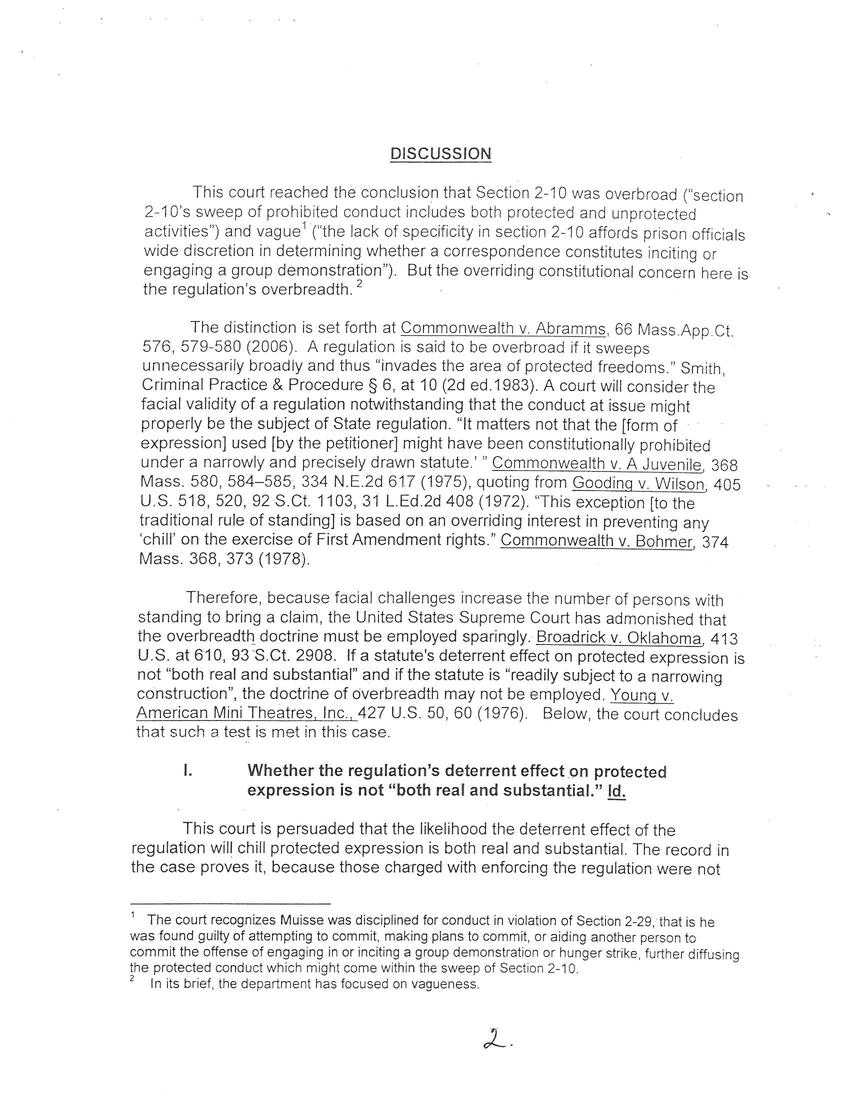
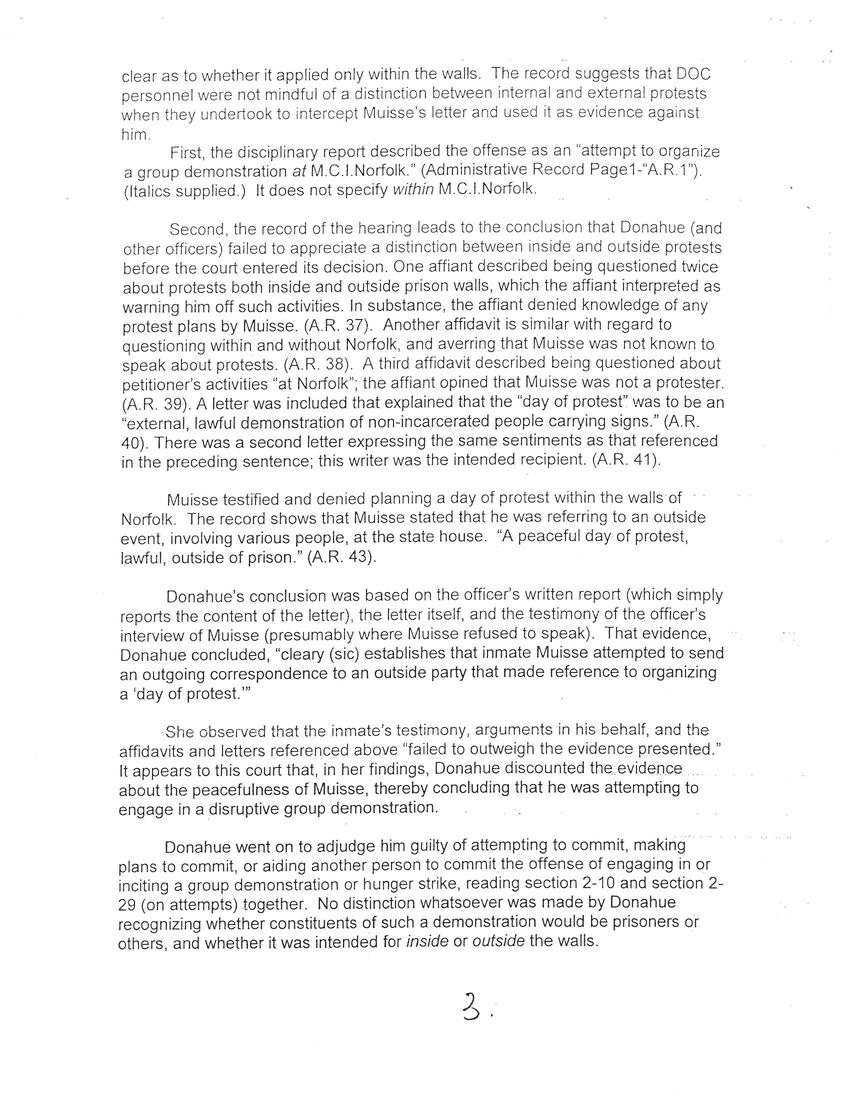
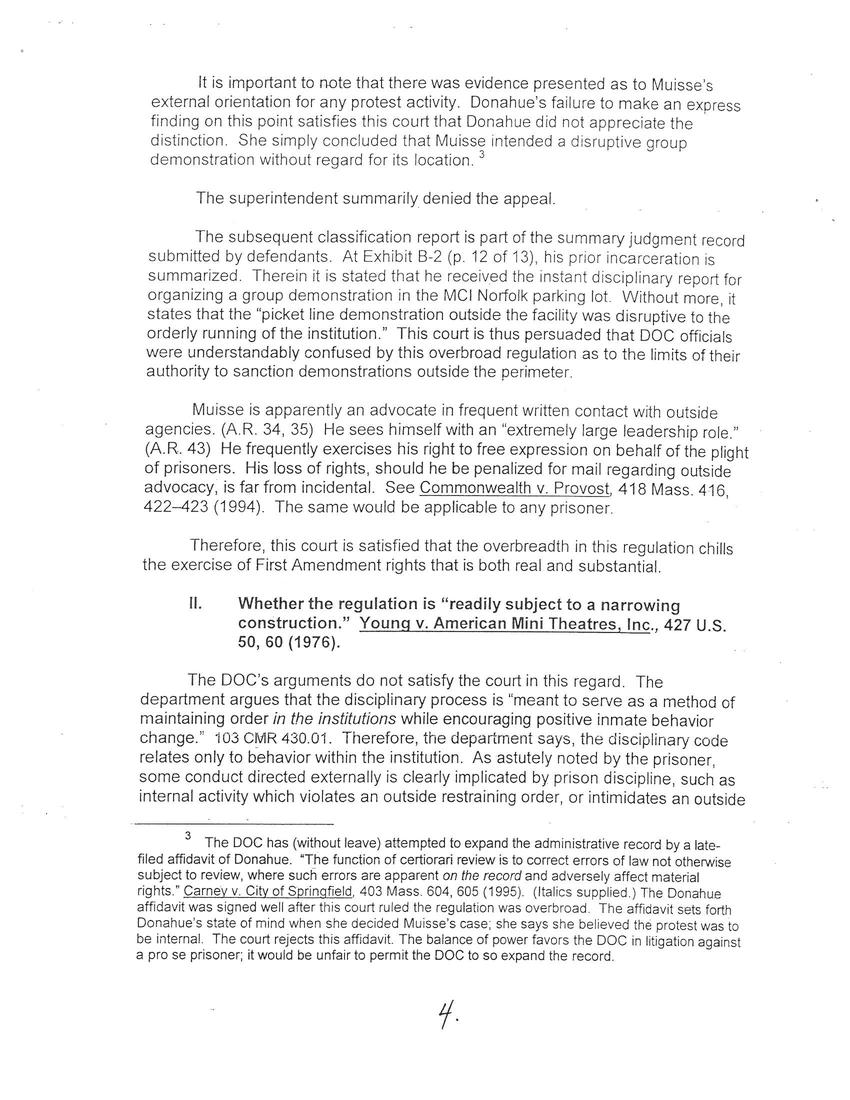
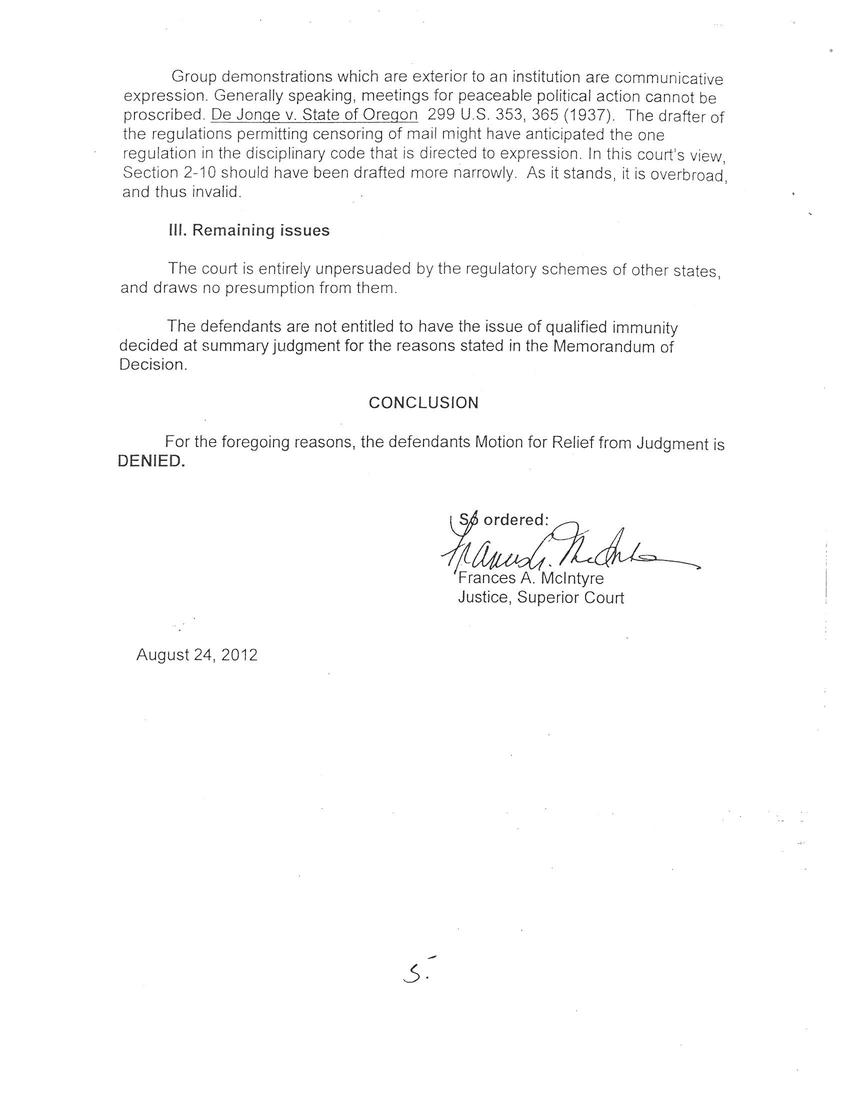

Replies (2)